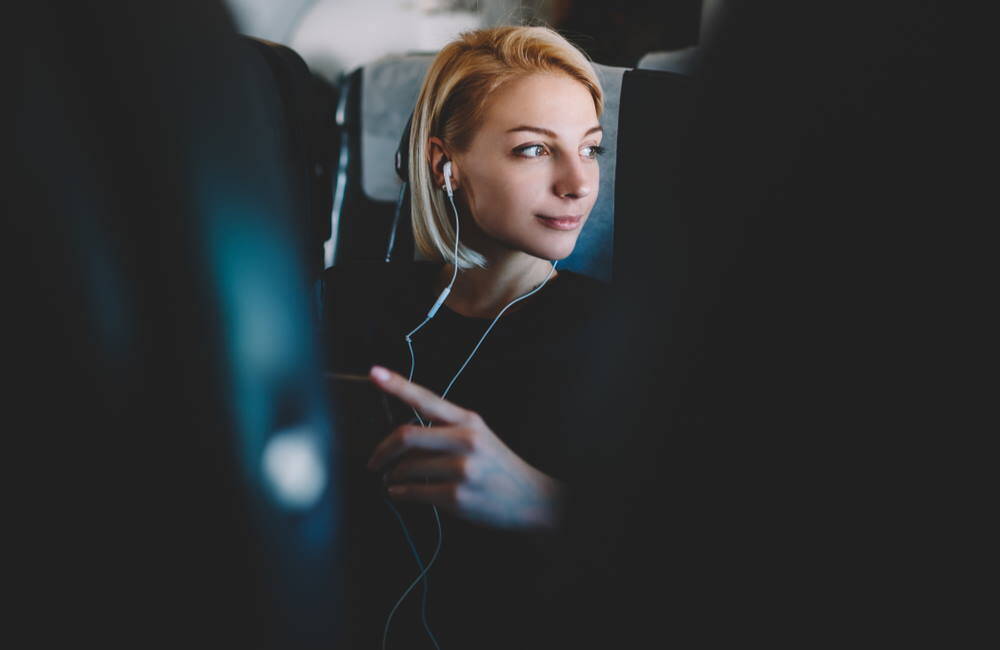Travel is a wonderful experience. But it also comes with its own set of challenges. To get ready for a flight, it’s important to have some in-flight entertainment at your disposal, including games, movies, music, books and good, old-fashioned conversation.
All can help smooth out a trip and provide things to do on a plane. To sort out the various options, here’s a look at in-flight entertainment options based on the emotions that people experience on a flight.
5 Ways to Improve Senior Air Travel
When You’re Stressed
Stress is what happens when your body reacts to what is perceived as a threat. For some, flying represents a threat, at least at a basic instinct level that you can’t always reason yourself out of quickly.
Stress can manifest in many ways, both physical and emotional. For example, you might experience a headache, sweating palms, a rumbling gastrointestinal tract, irritability, difficulty swallowing, lack of concentration, back or neck pain and a feeling of being overwhelmed. On flights, much of this comes from the loss of control in your environment.
One of the best ways to combat this is to know the statistics. Those facts show that the most dangerous parts of your trip are the drives to and from the airport. In an airplane, the odds of getting into an accident are about one in 11 million or, as Elite Daily puts it, “so slim it’s almost pointless to quantify.”
But stress doesn’t always respond to logic. To distract yourself, make sure you take in-flight entertainment that brings you comfort. This can include a pillow, blanket and a tablet loaded with your favorite TV shows (now is the time to watch all those old “Friends” episodes). An engaging book is a smart choice, as are headphones and music. Also, in addition to a book, make sure you bring fun things to do on a plane that don’t require Wi-Fi, such as crossword puzzles and Sudoku.
In-Flight Entertainment When You’re Anxious
Anxiety is a bit different than stress. While stress is a physical reaction to a threat (real or perceived), anxiety are the thoughts and feelings you get that feed off that stress. They, in turn, can lead to even more stress, according to Psycom.
So, in addition to what is listed above to deal with stress, here are some other tips for anxiety. One is to cut down on outside input that causes you stress and anxiety, such as turbulence. Try to sit near the center of the plane, where there is usually a bit less turbulence. Don’t sit near a window if seeing outside causes you anxiety. Take an aisle seat, instead.
As with all emotions, it’s better to acknowledge anxiety rather than suppress it. But don’t do what your anxious thoughts are telling you to do, because anxiety can trick common sense, according to the Anxiety and Depression Association of America. Also, while it might be tempting, now is not the time to have a few too many drinks of alcohol, as it will make things much more difficult when you land!
When You’re Tired
The change in air pressure can cause many people to feel tired and fall asleep easily. That’s just annoying to those who are sitting there, tired but wide awake. Luckily, there are DIY travel hacks that can help you get comfortable enough to really relax and catch some sleep on a flight. Some of the better ideas include bringing your own travel pillow and having headphones so you can play soothing music or sounds (make sure you have portable charger to keep your smartphone running, too). Also, a comfortable blanket can help you sleep easier.
When You’re Excited
This typically happens with less experienced travelers. There’s nothing wrong with that! Still, you’re going to have to turn that energy to something. One of the best ways to pass the time is to have a great conversation, but you might not be traveling with someone who likes to talk a lot. So, make sure to bring your own book, music or maybe catch an in-flight movie. All can give you something to focus on until you reach your destination and you can let all that excitement loose.
When You’re Injured
If you get hurt on vacation, it’s important to have planned ahead. Travel insurance can help in this case, as it operates as additional health insurance for your trip (not to be confused with trip insurance, which covers the loss of luggage). You’ll also want to consider contacting a non-emergency medical travel company to arrange your trip back home, so you can return to your own doctors and specialists as quickly as possible. These are some of the emotions you can expect during a flight, and some of the in-flight entertainment that can help you deal with them. Plane travel is safe, it’s up to you to also make it fun and enjoyable.

